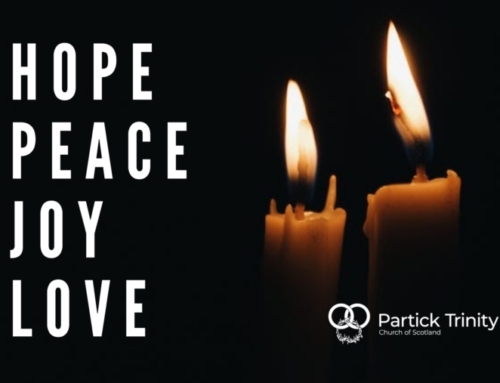Children, baptism and the promises of God
Why do we baptise children at Partick Trinity?
If you’ve been around our church (or any church like it) for any length of time, you’ll have sat through services involving the baptism of a baby or young child. There is something beautiful about seeing a baby up at the front (not always cooperating) surrounded by their family and being able to pray with hope and thanksgiving for a new life. Yet you might also be bemused as to what the water and accompanying words are all about. Indeed, perhaps like me, you were baptised in infancy, and yet have little sense of why or if that matters. You might also know churches where baptism is only for older children and adults, where it is offered as an individual’s response to personal faith (‘believer’s baptism’).
Let me try and say something (a lot more could be said) about why we baptise children of believers. Our starting point is not what the bible says about baptism itself, but to look at what the bible says about the promises of God to his people.
From the beginning of the bible to the very end, we see God’s desire to be in a relationship with his people. God commits to his people in the strongest possible terms. God promises to Israel, ‘I will take you as my own people, and I will be your God’ (Exodus 6:7). This commitment is not costless or casual. It is like the vows a couple make on their wedding day. God is faithful to his promise and his people, even as they prove faithless, distracted, and disinterested. This binding promise (or covenant) with his people and the steadfast love of God for his people always includes children. God does not wait for them to reach an age where they can acknowledge (far less respond) to this commitment or love; it is an act of grace. To some extent, we see an echo of this in ordinary family life, where a newborn child is named, loved, affirmed long before they can know or say anything about it.
When Christian parents long for their children to know the promises of God, their longing is not at odds with what God desires for their child (far less are they treading on God’s toes). Nor is this longing in conflict with what is best for our children, although this is increasingly contested in the individualistic age we live in. We are urged to find our own way, severing ties and obligations to others and to the past, and are discouraged from imposing our truth upon our children or anyone else. The bible, however, locates human freedom in relationships (not autonomy) and our identity in a community (not isolation). We belong to God and one another; we pray to our God, not my God or your God. Time after time, in his dealing with humanity, God makes his promises not to an individual but to families across multiple generations. We can trace God’s promises through his dealings with Abraham, Isaac, Jacob and onwards through their descendants, through slavery and rescue, exile, and return. The children of Christian parents are not born into a situation where they are on the outside of God’s family and promise; needing to prove they belong or like stowaways on a ship. There is wonderfully freeing and reassuring breadth to God’s promises.
To belong to God (and know you belong to God) is a beautiful thing. The consistent picture in the bible is that the children of believers truly do belong to God. There is a telling moment when little children are brought to Jesus so that he might pray for them, and his disciples try to turn them away (surely Jesus has grown-up people with grown-up problems to deal with?). Jesus sees it differently, he puts his hands on them and blesses them saying, ‘Let the little children come to me, and do not hinder them, for the kingdom of heaven belongs to such as these.’ Later in the New Testament in the book of Acts, we see that the proclamation of the early church brings together what Jesus has done with the long-established promises of God. Once more we find the place of children is not on the outside. When Peter addressing the crowds at Pentecost says:
‘Repent and be baptised, every one of you, in the name of Jesus Christ for the forgiveness of your sins. And you will receive the gift of the Holy Spirit. The promise is for you and your children and for all who are far off – for all whom the Lord our God will call.’ [Acts 2:28-29]
This brings us back full circle to baptism. The reason we baptise at all is because of Jesus’ instruction (taken forward by Peter and others):
“…go and make disciples of all nations, baptising them in the name of the Father and of the Son and of the Holy Spirit…” [Matthew 28:19]
We baptise infants because we recognise the breadth of God’s promises and the freedom of his grace. God’s promise goes beyond our capacity to understand (a statement that holds whether we are adults or children!). As we baptise an infant, we see a beautiful picture of the promises that bind us together within the family of God. The promise of forgiveness and of being washed clean. The promise of new life through Christ’s death and resurrection. The child does not yet know or trust the promise for themselves, and our faith may waver, but these promises are upheld by the loving-kindness of God.
Therefore, when we baptise our children before the church family gathered in worship, our hope in Christ and our hope for our children are brought together in a visible, tangible way. We affirm that the child is known and loved by God and belongs to God’s family in Christ. We pray for parents and families, asking God for his help in raising children whilst recognising the role of the whole church family nurturing faith in an atmosphere of love. As we take a little one and baptise them with water in the name of the Father and of the Son and of the Holy Spirit, we give thanks for God’s promises as we trust that, in due time, the child will know for themselves the love of God and their place within God’s family.
– Tim Sinclair, Minister.







